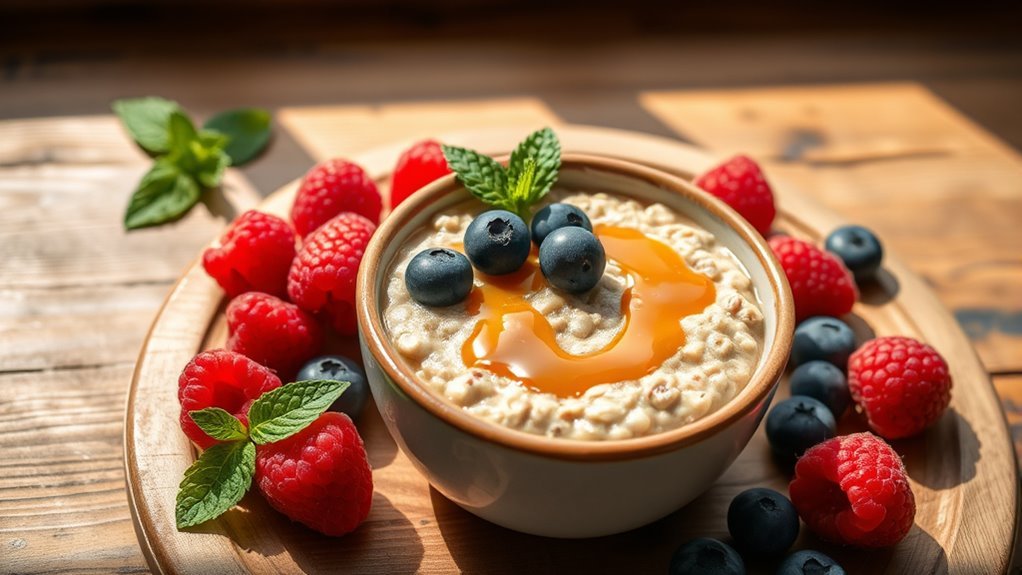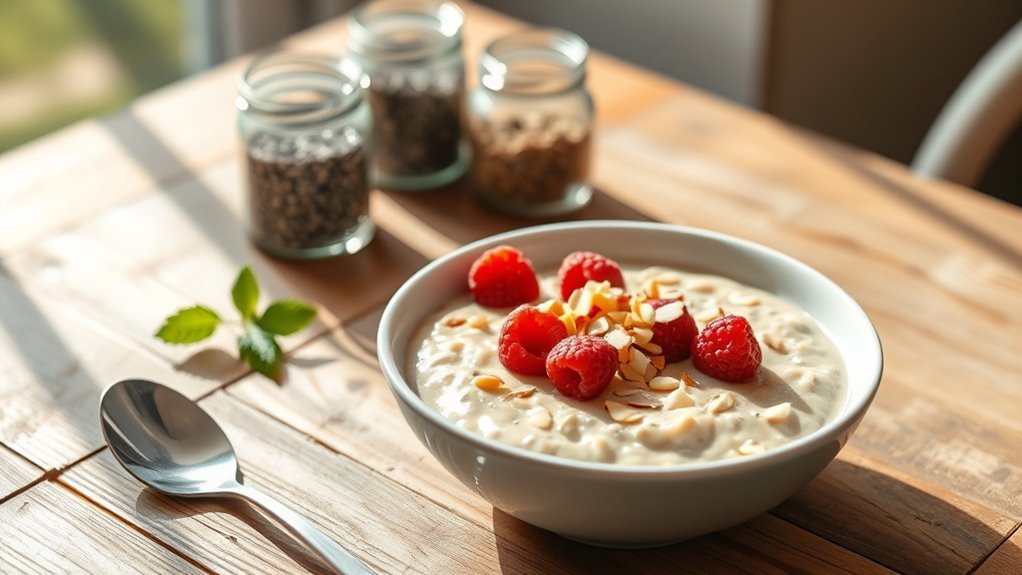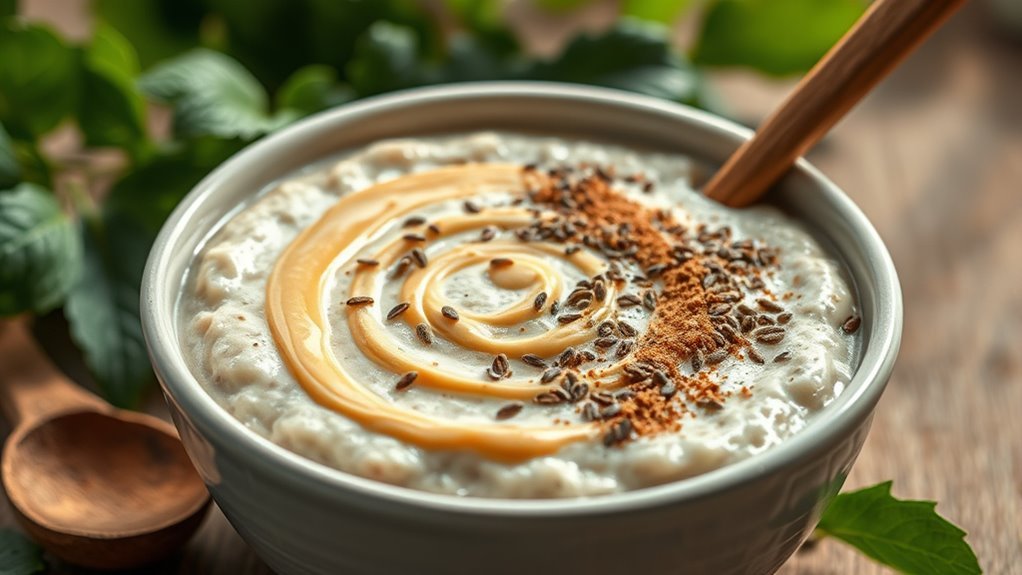You can eat oatmeal on a ketogenic diet, but portion control is essential. Oatmeal is high in carbohydrates, typically containing around 27 grams per serving, which can interfere with staying in ketosis. However, mindful eating and smaller servings can allow for its occasional inclusion. If you choose to enjoy oatmeal, consider low-carb toppings and alternatives that fit better within your daily carb limits. Discover more tips on balancing oatmeal with other keto-friendly foods and breakfast options.
Understanding the Ketogenic Diet

The ketogenic diet, often referred to as keto, primarily focuses on drastically reducing carbohydrate intake while increasing fat consumption, which can shift your body into a state of ketosis. This metabolic state allows your body to burn fat for fuel instead of carbohydrates. Understanding the ketogenic principles behind this diet can help you navigate your food choices more effectively. As you adapt to fat as your primary energy source, you’ll experience fat adaptation, where your body becomes more efficient at utilizing fats. This shift can lead to improved energy levels and mental clarity. Embracing these principles grants you the freedom to explore diverse high-fat foods while minimizing carbs, making your dietary journey both enjoyable and sustainable. Additionally, it’s essential to be mindful of carbohydrate content in foods like oatmeal, as it can significantly impact ketosis.
The Nutritional Profile of Oatmeal

Oatmeal, a popular breakfast choice, boasts a rich nutritional profile that includes essential vitamins, minerals, and fiber. You’ll find that oatmeal nutritional benefits extend beyond just a comforting meal; it provides B vitamins, iron, and magnesium, which are crucial for your overall health. The oatmeal fiber content is particularly significant, as it contains both soluble and insoluble fibers, promoting digestive health and helping to regulate blood sugar levels. Incorporating oatmeal into your diet can enhance feelings of fullness, making it easier to manage your appetite. While oatmeal is a nutritious option, it’s important to evaluate how it fits into your dietary goals, especially if you’re considering a low-carb lifestyle. Balance is key to enjoying the benefits without compromising your choices.
Carbohydrate Content in Oatmeal

When considering oatmeal on a keto diet, understanding its carbohydrate content is essential. A typical serving of oatmeal can contain around 27 grams of carbs, which might exceed your daily carb limit on keto. It’s important to analyze how this fits into your overall dietary goals while balancing your nutritional needs. Additionally, the higher carbohydrate content of oatmeal compared to other alternatives may hinder achieving a state of ketosis.
Oatmeal Carbohydrate Breakdown
Understanding the carbohydrate content in oatmeal is essential for anyone considering a ketogenic diet. Oatmeal typically contains about 27 grams of carbs per cup, which can greatly impact your daily carb limit on keto. However, the oatmeal glycemic index is relatively low, meaning it has a lesser effect on blood sugar levels compared to higher-glycemic foods. Additionally, oatmeal’s fiber content plays an important role; with around 4 grams of fiber per cup, it can help mitigate blood sugar spikes. While oatmeal offers benefits, it’s critical to be mindful of portion sizes. If you’re determined to maintain ketosis, consider alternatives like chia or flaxseed, which provide healthy fats and fiber with lower carb counts.
Keto Diet Carb Limits
For those following a ketogenic diet, it’s important to keep track of your daily carb intake, as exceeding your limit can hinder your ability to maintain ketosis. Generally, keto carb limits are set between 20 to 50 grams of net carbs per day, depending on individual factors like activity level and metabolic health. Oatmeal, while nutritious, contains about 27 grams of carbs per cup, which can quickly use up your daily allowance. When tracking carbs, consider alternatives like chia seeds or flaxseeds, which are lower in carbohydrates and higher in fiber. Ultimately, understanding your specific needs and how oatmeal fits into your daily carb limits will empower you to make informed choices that align with your keto lifestyle. Additionally, opting for low-carb toppings can enhance your oatmeal while keeping it within your carb limits.
Impact of Oatmeal on Ketosis
While oatmeal is often praised for its health benefits, its impact on ketosis can be a concern for those following a ketogenic diet. Oatmeal is high in carbohydrates, which can hinder your body’s ability to maintain ketosis. When you consume oatmeal, the sugars from carbohydrates can spike insulin levels, potentially disrupting ketosis effects. However, oatmeal also provides valuable nutrients such as fiber and antioxidants, which can support overall health. If you’re keen to enjoy oatmeal, consider portion control and its place within your daily carb limits. Balancing oatmeal benefits with your ketogenic goals is essential, allowing you to enjoy its nutritional perks while staying mindful of your carb intake. Ultimately, it’s about finding what works best for you. Incorporating low-carb alternatives can help you satisfy cravings without compromising your ketogenic lifestyle.
Alternatives to Oatmeal for Breakfast
If you’re looking for breakfast options that align with a ketogenic diet, there are plenty of tasty alternatives to oatmeal that won’t disrupt your ketosis. You might consider chia seed pudding, which is rich in fiber and healthy fats, making it a great choice. Another option is scrambled eggs with avocado—packed with protein and healthy swaps for traditional carbs. Greek yogurt topped with nuts or seeds can also satisfy your morning cravings while keeping your carb intake low. Finally, cauliflower rice cooked with spices offers a unique breakfast twist. These healthy swaps not only provide variety but also guarantee you stay on track with your keto lifestyle, making breakfast enjoyable and compliant with your dietary goals. Additionally, incorporating chia seeds can enhance your meals due to their high fiber content, which supports digestive health and promotes fullness.
Low-Carb Oatmeal Recipes
Although oatmeal is often associated with high-carb breakfasts, there are several low-carb oatmeal recipes that can fit perfectly into your ketogenic lifestyle. You can try chia seed pudding, which mimics oatmeal’s texture while offering healthy fats and fiber. Another great option is flaxseed meal porridge, combining flaxseeds with unsweetened almond milk and your favorite sweetener. Additionally, consider using other oatmeal substitutes like hemp hearts or coconut flour to create a satisfying breakfast. These low carb grains provide similar satisfaction without the carbs. You can customize these recipes with nuts, seeds, or berries, ensuring you stay within your carb limits while enjoying a delightful breakfast. Embrace these alternatives and enjoy the freedom of a delicious keto-friendly meal! Fat-rich option aligns well with the benefits of incorporating low-carb ingredients into your diet.
Tips for Incorporating Oatmeal Mindfully
When incorporating oatmeal into your keto diet, practicing portion control is essential to maintain your carb intake. Consider pairing your oatmeal with low-carb toppings like nuts or berries, which can enhance flavor without greatly increasing carbohydrates. By being mindful of both portion sizes and toppings, you can enjoy oatmeal while staying aligned with your dietary goals.
Portion Control Strategies
Portion control plays an essential role in incorporating oatmeal into a keto diet without exceeding your carbohydrate limits. To practice mindful eating, start by measuring your portion sizes; a standard serving is about a quarter cup of dry oats. This small quantity allows you to enjoy oatmeal while keeping carbs in check. Consider using a food scale for accuracy and be aware of what a serving looks like visually. You might also benefit from pre-portioning your oatmeal into containers, making it easier to grab when you’re busy. Slow down during meals, savoring each bite to help you feel satisfied with less. By being intentional about your servings, you can enjoy oatmeal mindfully while maintaining your keto lifestyle.
Low-Carb Toppings Options
Mindfully enhancing your oatmeal with low-carb toppings can elevate both flavor and nutritional value while keeping your keto goals intact. Consider adding low carb fruits like berries, which are not only delicious but also packed with antioxidants. A sprinkle of chia seeds can boost fiber and provide healthy omega-3 fats without spiking your carb count. Nut butter, such as almond or peanut butter, adds creaminess and protein, making your meal more satisfying. Just be mindful of portion sizes to maintain your carb limits. By thoughtfully choosing these toppings, you can enjoy a more balanced bowl of oatmeal that aligns with your keto lifestyle while still feeling free to indulge in flavors you love.
Common Misconceptions About Oatmeal and Keto
Although many people believe oatmeal is off-limits on a ketogenic diet due to its carbohydrate content, this common misconception overlooks the nuances of nutritional choices. Not all oatmeal is created equal; while traditional oats are high in carbs, there are low-carb alternatives like chia seeds or flaxseed meal that mimic oatmeal’s texture. Keto myths often exaggerate the impact of carbs without considering fiber’s role, which can mitigate blood sugar spikes. In addition, portion control is key—small servings can fit into a keto lifestyle if balanced with other low-carb foods. Understanding these oatmeal misconceptions empowers you to make informed decisions that align with your dietary goals, providing you the freedom to enjoy a variety of foods while staying on track.
Balancing Oatmeal With Other Keto-Friendly Foods
To successfully incorporate oatmeal into your keto diet, it’s important to balance it with other keto-friendly foods. While oatmeal can be higher in carbs, you can enjoy it mindfully by pairing it with low-carb options like nuts, seeds, or nut butter, which add healthy fats and protein. This helps stabilize your blood sugar and keeps you feeling full longer. Consider oatmeal alternatives like chia seed pudding or flaxseed meal to diversify your breakfast while maintaining your carb limits. By choosing these combinations, you can enjoy the comforting aspects of oatmeal without derailing your keto goals. Remember, it’s all about balance and making informed choices that align with your dietary preferences and lifestyle.
Frequently Asked Questions
Can I Eat Oatmeal While Intermittent Fasting on Keto?
You shouldn’t eat oatmeal while intermittent fasting on keto. Oatmeal’s high carbohydrate content conflicts with keto guidelines, which prioritize low-carb intake for ketosis. During your fasting window, it’s crucial to consume minimal calories to maintain the benefits of intermittent fasting. Instead, focus on low-carb options like eggs or leafy greens, which align better with both keto principles and your fasting goals, allowing you the freedom to enjoy your eating periods without compromising your regimen.
What Are the Best Toppings for Keto-Friendly Oatmeal?
For keto-friendly oatmeal alternatives, consider toppings like unsweetened almond butter, chia seeds, or flaxseeds to boost healthy fats and fiber. You could also add a sprinkle of cinnamon or a few berries for flavor without spiking your carb count. If you’re looking for more variety, try using cauliflower rice or shredded zucchini as a base, then top with nuts or coconut flakes for a satisfying meal that aligns with your keto lifestyle.
Is Steel-Cut Oatmeal Better Than Instant Oatmeal on Keto?
When it comes to steel-cut oatmeal versus instant oatmeal, the former often shines brighter. Did you know that steel-cut oats have about 25% more fiber than instant oats? This fiber promotes satiety and better digestion, making it an excellent choice for a balanced diet. On the flip side, instant oatmeal has its drawbacks, including added sugars and lower nutritional value. Choosing steel-cut oats can support your health goals without sacrificing freedom in your diet.
How Does Oatmeal Affect Blood Sugar Levels on Keto?
Oatmeal can greatly impact your blood sugar levels due to its glycemic index. Foods with a higher glycemic index cause a quicker spike in blood sugar response. While steel-cut oats have a lower glycemic index compared to instant oats, they can still elevate your blood sugar. If you’re aiming for stable levels on keto, it’s essential to monitor portion sizes and consider alternatives that align better with your dietary goals.
Can I Meal Prep Oatmeal for a Keto Diet?
You can’t meal prep oatmeal for a keto diet, as traditional oats are high in carbs. Instead, consider keto alternatives like chia seeds or flaxseed meal, which can be prepped in advance and offer similar textures. These options are low in carbs and high in fiber, making them more suitable for your keto lifestyle. By incorporating these alternatives, you’ll maintain your dietary goals while enjoying the freedom of meal prepping.
References
- https://www.healthline.com/nutrition/keto-diet-foods
- https://www.medicalnewstoday.com/articles/324632
- https://www.ncbi.nlm.nih.gov/pmc/articles/PMC6520970/
- https://www.webmd.com/diet/what-is-the-keto-diet
- https://www.verywellfit.com/the-ketogenic-diet-4175804
- https://www.bbcgoodfood.com/howto/guide/what-keto-diet
- https://www.dietdoctor.com/low-carb/keto
- https://www.nutrition.gov/topics/nutrition-101/low-carb-diet
- https://www.cdc.gov/healthyweight/healthy_eating/index.html


